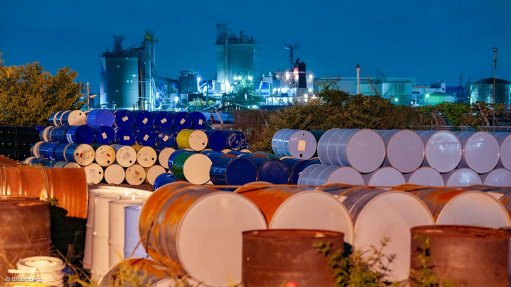Does South Africa really care about the environment?
This article has been supplied by the author and has not been written or solicited by Creamer Media. It may be available only for a limited time on this website.
By Lance Dickerson, REVOV MD and co-founder
Eskom recently announced that the first rollout of its Battery Energy Storage System (BESS) was completed at the Hex substation in Worcester in the Western Cape. The correct response to this is: “About time”. Eskom should certainly be congratulated for following through on the progressive project, but important questions need to be asked about how it compounds the sustainability paradox.
Shortly after the Eskom announcement on BESS, South Africa granted environmental approval to Karpowership, sparking concerns about environmental impact over and above the other concerns linked to the project. With the expected burning of heavy oil by the ship, it is especially disheartening that in the pursuit of energy, environmental harm is simply accepted.
We all want energy stability, and the ability to store electricity generated through a myriad - hopefully clean - sources goes some way in this pursuit. However, it is the grand aspiration of reducing our negative impact on the environment that attracts all the attention, and - if we are frank - the funding.
Regarding the BESS investment, Eskom writes on its own website about its battery strategy: “Through BESS, Eskom aspires to enable the integration of distributed energy resources and pursuing a low-carbon future to reduce the impact of greenhouse gas emissions on the environment. The 1440 megawatt-hours (MWh) distributed BESS with 360 megawatts (MW) Solar Photovoltaic (PV) represents a giant leap forward in achieving this aspiration.”
No one would - or should - disagree with the intention to pursue a low-carbon future to reduce the impact of greenhouse gas emissions. The climate clock estimates that we only have eight years and five months left until global temperatures have increased by the dreaded 1.5 degrees celsius.
However, the sustainability paradox arises when the pursuit of environmentally friendly technologies, such as energy storage, contributes to environmental degradation due to the extraction and processing of raw materials needed for these solutions. In other words, the minerals that make up those batteries - most notably lithium - need to be mined. Cobalt, manganese, lithium, graphite and nickel will need to be extracted from mines around the world, and on this continent from countries such as the Democratic Republic of Congo, Zimbabwe, South Africa, and others. Congo, alone, has millions of tonnes of lithium reserves and when read against the fact that those batteries in the BESS systems are lithium-ion, a story begins to emerge.
Every tonne of lithium mined equates to 15 tonnes of carbon dioxide being released into the atmosphere. This is in addition to the social upheaval, logistics of moving raw materials to countries far away, and - of course - the beneficiation. And so, Africa, which is responsible for only 10%, but probably less, of the world’s carbon emissions, suffers disproportionately as the continent is the least equipped to cope with the negative impacts of climate change.
It’s usually here that we are told that there needs to be measured compromises. This is not true and a cop out. Acid rain is acid rain - irrespective of whether it was caused by the noble intention of saving the planet or not.
However, there is a very easy solution, and it resides in the electric vehicle (EV) ecosystem. EV batteries are replaced when the weight of the battery compared to output becomes an issue in a vehicle. The cells in these replaced batteries - because of how EV batteries are built - still have the same, but most likely more, life than batteries built exclusively for stationary storage. This is a gaping hole in the circular economy where yet another paradox, where batteries would end up in landfills, is solved. The EV batteries, when deployed in storage solutions, solve two problems: they keep batteries out of the earth and they provide a storage solution that does not increase the carbon burden on the planet.
An initial concern might be that there are not enough of these around. The opposite is true. A short visit to just one Chinese city such as Shenzhen will paint a picture of just how many EV cells there are to provide stationery storage. It is estimated that there will be 750,000 EVs in Shenzhen by 2025. That’s a single city.
Read against ambitious targets in the EU, it becomes clear that an almost endless supply of EV storage batteries is just waiting to be deployed into BESS solutions and other applications where those who invest in them genuinely care about the environment as opposed to saying the right thing while being prepared to make costly carbon compromises.
Naturally, the next point of interest would be performance. Surely, one would contend, a battery made exclusively for storage is superior? Think again. The rigorous testing performed on EV batteries is second to none - pressure tests, impact tests, heat tests, penetration tests, charge and discharge tests, the list is almost endless. Only cells that have made it through all these stringent protocols make it into EV batteries - the rest find their way into other applications such as storage-only batteries. It makes sense, because the operating conditions in an EV are harsh - rapid charge and discharge cycles, excessive heat, the need to energise powerful power trains, and much more.
This is the reason our engineers only build BESS systems with EV storage batteries. As our first-generation EV storage batteries attest, having performed at a superior rate to stationary lithium iron phosphate batteries for a lifespan just as long and in some instances longer, there is no longer any debate around the superiority of EV lithium batteries.
The switch on a national scale could easily be achieved, but it requires a mindset that prioritises genuine net zero aspirations over hot air.Just as our engineers are actively working on recycling technologies for the end-of-life phase of EV storage batteries, we need more people in South Africa - and the world - to stop and think about every investment they make. Is it making the planet healthier or is it merely perpetuating the problem dressed in a different technology? Or worse, is it bringing fossil fuels back into the equation because we have a crisis and are told this is the only solution? Funders might forgive a compromise, but your children and their children’s children won’t.
Comments
Press Office
Announcements
What's On
Subscribe to improve your user experience...
Option 1 (equivalent of R125 a month):
Receive a weekly copy of Creamer Media's Engineering News & Mining Weekly magazine
(print copy for those in South Africa and e-magazine for those outside of South Africa)
Receive daily email newsletters
Access to full search results
Access archive of magazine back copies
Access to Projects in Progress
Access to ONE Research Report of your choice in PDF format
Option 2 (equivalent of R375 a month):
All benefits from Option 1
PLUS
Access to Creamer Media's Research Channel Africa for ALL Research Reports, in PDF format, on various industrial and mining sectors
including Electricity; Water; Energy Transition; Hydrogen; Roads, Rail and Ports; Coal; Gold; Platinum; Battery Metals; etc.
Already a subscriber?
Forgotten your password?
Receive weekly copy of Creamer Media's Engineering News & Mining Weekly magazine (print copy for those in South Africa and e-magazine for those outside of South Africa)
➕
Recieve daily email newsletters
➕
Access to full search results
➕
Access archive of magazine back copies
➕
Access to Projects in Progress
➕
Access to ONE Research Report of your choice in PDF format
RESEARCH CHANNEL AFRICA
R4500 (equivalent of R375 a month)
SUBSCRIBEAll benefits from Option 1
➕
Access to Creamer Media's Research Channel Africa for ALL Research Reports on various industrial and mining sectors, in PDF format, including on:
Electricity
➕
Water
➕
Energy Transition
➕
Hydrogen
➕
Roads, Rail and Ports
➕
Coal
➕
Gold
➕
Platinum
➕
Battery Metals
➕
etc.
Receive all benefits from Option 1 or Option 2 delivered to numerous people at your company
➕
Multiple User names and Passwords for simultaneous log-ins
➕
Intranet integration access to all in your organisation


















